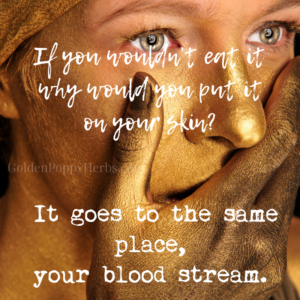Not only is it important to eat organic foods and avoid certain type of cookware and containers, it's also important to avoid chemicals in your personal care and home cleaning products.
Even though it's not on the inside, your skin is your largest organ. It's main function is to act a protective barrier for your body, to keep out pathogens and allow for the flow of air and moisture for temperature control (1), but it's not the kind of barrier that keeps everything out and everyhting in, it's a semipermeable membrane (2), which means things can get in, including things you don't always want. (3)
There are many types of drugs and supplements that needs to be absorbed through the skin, whether that’s hormone replacement cream, magnesium oil, or something else (like Nicotine patches). But many people don't often think about all the other stuff that you put on your skin that's getting absorbed in to your body, things you might not want to be absorbed – soap, sunscreen, make-up, deodorant, lotion…the list goes on.

One of the top industries where workers are exposed to potentially hazardous chemicals that can be absorbed through the skin is the cosmetics industry (4), so if people working with these chemicals are at risk, why would you want to put those chemicals on your skin once they're in a product?
The lure of ever lasting youth and beauty is a strong one, but it's not worth preserving yourself with chemicals if those chemicals cause a cancer and you die at a younger age.
This is part of why we are so pasisonate about natural and organic products, and a big reason we started making our own. You can check out all the natural body care and face care products we make in our online store.
THESE ARE SOME COMMON CHEMICALS IN PERSONAL CARE PRODUCTS YOU SHOULD DO YOUR BEST TO AVOID.
TRICLOSAN
Triclosan is an antimicrobial agent often added to soap, shampoo, and other personal care products. It can be absorbed through the skin, and has been detected in human urine, serum, and breast milk. (5)
With the recent focus on the importance of our microbiome and the growing threat of superbugs, people are beginning to question its widespread use, especially in antibacterial soap. Studies as early as 2006 have expressed concern over bacterial resistance to triclosan, as well as the greater fear of triclosan-induced resistance to clinically important antimicrobial drugs. (6)
Triclosan came under fire back in November when a study was released linking triclosan exposure to liver cancer in mice. (7) In the study, triclosan acted as a cancer promoter, which means it didn’t cause cancer on its own, but it increased susceptibility to cancer and accelerated tumor formation after long-term exposure.
Triclosan has also been suspected as an endocrine disruptor, although a recent review of the literature concludes that triclosan exposure through the use of personal care products is unlikely to adversely affect endocrine function in humans. (8) Unfortunately, this review was funded by the Colgate-Palmolive Company, and although there’s limited or no evidence that triclosan exposure through personal care products has harmful effects in humans, several studies have shown triclosan to adversely affect thyroid and reproductive function in rats.
To top it all off, triclosan-containing soaps don’t appear to provide any benefit over regular soap for preventing the spread of disease, so there’s really no reason to use it. (9) I suggest avoiding tricolsan completely.
PHTHALATES AND PARABENS
Like triclosan, phthalates and parabens are found in a variety of personal care products, although phthalates are more common in lotions because they act as moisturizers and enhance skin penetration of other compounds. (10) Parabens can be absorbed intact through the skin, and both chemicals have been detected in breast milk, urine, and plasma. (11)
A big concern over phthalates and parabens is increased risk for breast cancer. One study found that an increased concentration of phthalate metabolites in the urine was associated with an increased risk for breast cancer, and intact parabens have been detected in breast cancer tissue. (12, 13) Phthalates have also been implicated in reproductive and endocrine disruption, although like triclosan, the evidence is preliminary and may not be relevant in humans at normal levels of exposure. (14)
And although personal care products represent only a small portion of total environmental exposure to phthalates, they are the main mode of exposure for parabens, indicating significant levels of absorption through the skin. (15, 16)
SULFATES, PROPYLENE GLYCOLS, AND FRAGRANCES
Other chemicals you’ll find in soaps and lotions include sulfates, such as sodium laurel sulfate and sodium laureth sulfate, fragrances, and petroleum by-products such as propylene glycol.
Propylene glycol isn’t absorbed through the skin in large amounts, and the only reports of toxicity in humans have been in cases of extreme exposure through IV medication or through repeated application to second- and third-degree burns over a large area of the skin. (17, 18) Sodium lauryl sulfate, however, does penetrate the skin, at least in rat models, and can cause skin irritation. (19, 20)
The category of “fragrances” is so vast and non-specific that it’s difficult to evaluate them, but they’re a common cause of contact dermatitis. (21) One big problem with “fragrances” is that they’re poorly regulated, and “fragrance” on an ingredient label could mean just about anything. For this reason, it’s best to avoid them.
Further, there could be more chemicals in skin care products than those actually listed on the bottle. Analysis of shampoo and similar products has found contamination by 1,4-dioxane, a known carcinogen, and phthalates have been detected in products that don’t have them listed as ingredients. (22, 23)
Like many of the chemicals we’re exposed to from food and our environment, most of the chemicals allowed in our skin care products don’t show overt toxicity in humans, but may have concerning preliminary evidence linking them to cancer or endocrine disruption. Apparently this doesn’t warrant removing these chemicals from products, but considering how easy it is to switch to more natural products, there is reason enough to avoid using them.
NON-TOXIC ALTERNATIVES
The great thing about soap is that it’s incredibly easy to find a natural alternative. Dr. Bronner’s castile soap is a popular choice, but there are tons of other options, in fact we sell lovely hand-made natural soap in our store.
Lotion is another easy one. Oils like coconut, jojoba, and even olive oil are great for your skin and widely available. And unlike petroleum-based lotions, they’ll actually moisturize your skin instead of drying it out! We have a wide variety of lotions that we make in small batches in our store. They don't have any preservatives though, so their shelf-life is hsorter than regular lotions, but that also means they are made fresh on a regular basis.
We also have a large variety of body oils that are fabulous for aplying after you shower (in fact this is owner Sarah's favorite way to care for her dry Colorado skin)
Skincare for your face is a place you can make a huge (and easy) switch. We have a large variety of natural skincare products that we make in house for all types of skin.
Shampoo can be a little harder to replace, but there are tons of resources online if you want to forgo traditional shampoo. Simple ingredients such as bentonite clay, apple cider vinegar, and even honey can clean and condition hair without the chemicals. This post has lots of helpful links and recipes to get you started.
Another option would be to forgo soap, shampoo, and lotion entirely. This might sound radical, but recent research has shown that our skin has a microbiome (much like our gut) which acts as a built-in cleanser, deodorant, anti-inflammatory and immune-booster. The chemicals in skin care products can disrupt this microbiome, so going without them may restore your skin’s ability to take care of itself.
We only use soap once every couple of weeks. Shampoo has been a little harder for us to eliminate; we do still use it about once a week, but we use a brand with no harmful chemicals.
We also make a great shaving cream that's perfect for men and women, as well as a full line of natural baking soda-based deodorants that we've gotten great feedback on.
Whatever works best for you, just make sure you're paying attention to the ingredients.
Thank you to Chris Kresser for the links to all the studies about these chemicals!



